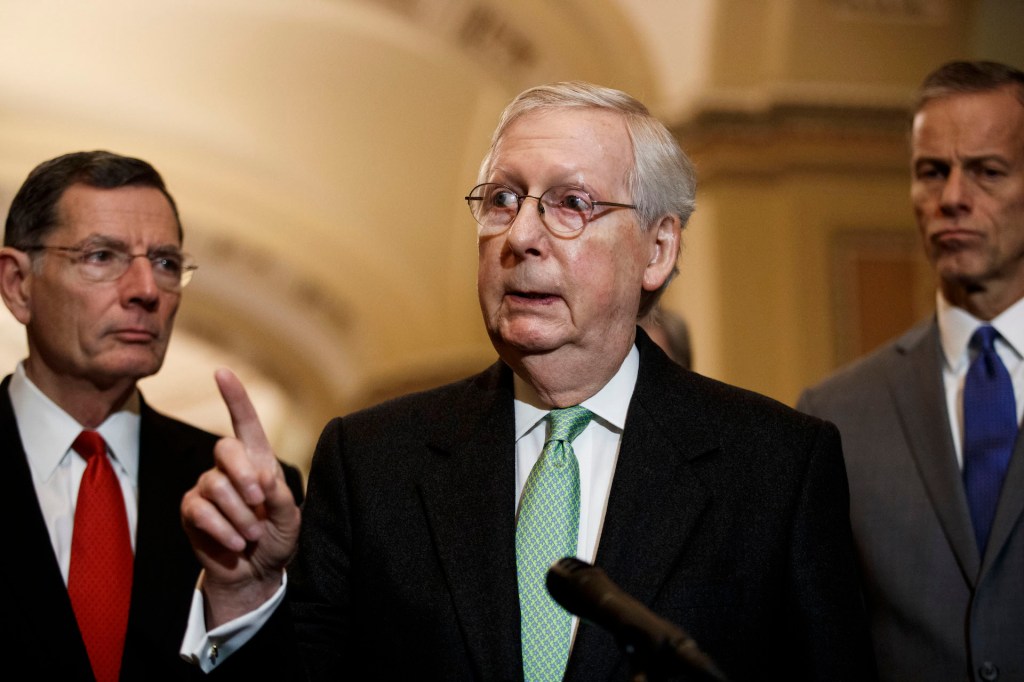Want the best of VICE News straight to your inbox? Sign up here.
The impeachment process now moves from the rowdy House of Representatives to the Senate, a chamber crafted by the founders to handle weighty moments like this. That is, if House Speaker Nancy Pelosi decides to send them. She indicated Thursday she might let the Senate stew awhile until she can be assured the articles get a fair hearing.
Videos by VICE
Senate Majority Leader Mitch McConnell has already signaled he’s here for one thing, and that’s to defend President Trump.
“I’m not an impartial juror. This is a political process. There’s not anything judicial about it,” McConnell told the congressional press corps just outside the Senate chamber on Tuesday. “The House made a partisan political decision to impeach; I would anticipate we will have a largely partisan outcome in the Senate. I’m not impartial about this at all.”
This week he rejected Minority Leader Chuck Schumer’s request to bring in four witnesses to testify before the entire Senate who refused requests to testify in the House investigation, including former National Security Adviser John Bolton and acting White House Chief of Staff Mick Mulvaney.
McConnell’s rigid, partisan stance is infuriating Democrats.
“What Mitch McConnell did was just morally outrageous,” Sen. Sherrod Brown (D-Ohio) told VICE News on his way to a vote. “We knew what he was doing, how he was voting, and how he was coordinating with the White House, but that he would say that’s the proper place for the majority leader of the Senate is shameful.”
READ: Nancy Pelosi Just Made a Major Impeachment Power Play
True to form, most Republicans are rallying around McConnell and rebuffing Democrats’ demands to hear firsthand from Trump’s senior foreign policy advisers.
Battle over witnesses
“Listen, if they wanted to have witnesses, why didn’t they go to court and challenge the administration’s judicial process?” Senate Intelligence Chair Richard Burr of North Carolina told VICE News. “They did in the Nixon [impeachment trial], they did in the Clinton [trial]. They chose not to do it now, because, apparently, it didn’t fit into their time frame.”
The majority of rank-and-file Republicans argue the House investigation, which will be presented to the Senate by some of House Speaker Nancy Pelosi’s top lieutenants, already produced enough material for senators to be able to weigh the arguments that will be presented by both sides of the case.
“I think most of the facts are already in evidence, and there’s very little disagreement about those facts,” Sen. Todd Young (R-Ind.) said. “My expectation would be that we’ll hear those facts once again put before the United States Senate in a formal fashion by the impeachment managers, and if there’s any disagreement about the facts that were put in evidence, we’ll of course hear from the president’s counsel.”
READ: Trump Just Got Impeached While Holding a ‘Merry Christmas’ Rally
But Democrats argue the Trump administration has set up roadblocks at every turn, including blocking the release of documents sent between the White House, the State Department, and the Department of Defense relating to why military aid to Ukraine was initially withheld.
“Who could possibly argue that the Senate should not have those? The White House stonewalled Congress, which when you stonewall over documents, I think, ‘Hmmm, guilty conscience, there’s something in there you don’t want people to see,’” Sen. Tim Kaine (D-Va.) told reporters at the Capitol.
Kaine’s a Harvard-educated lawyer who says back when he was a practicing attorney, he often relied more on documents than on witnesses in courtrooms.
“Cases often rise or fall more on documents than they do on witnesses, because the documents just make it plain,” Kaine said. “The single best piece of evidence thus far was a document. It was the memorandum of the Trump phone call — that is the single best piece of evidence, and it’s likely these documents are likely to be very powerful.”
READ: It’s Official: Trump Just Got Impeached
Even with McConnell vowing to carry Trump’s water for him in the Senate, a few more independent-minded Republicans are promising to put their constitutional duty to impartially weigh the evidence ahead of protecting their party’s leader.
‘Of course I will act as a juror’
“Of course I will act as a juror and will be unbiased and evaluating the cases that are presented,” Sen. Mitt Romney (R-Utah) told reporters just off the Senate floor.
All eyes will also be on some vulnerable Republicans who have tried to maintain the “centrist” mantle in spite of supporting most of Trump’s agenda, including Sens. Susan Collins of Maine — who just officially announced her reelection this week — and Cory Gardner of Colorado, who’s bracing for what promises to be one of the most expensive Senate races in the nation next November.
While most Democrats have written off those senators and others when it comes to impeachment, not all have.
More senior Democrats, including some who were in Congress during Clinton’s impeachment trial back in 1999, think a lot of the partisanship that marks contemporary Washington will dissipate once Chief Justice John Roberts walks into the Senate chamber clad in his sober black robe to oversee the historic impeachment trial.
“I’ve seen it is a place apart from the usual Senate business. The minute you walk in, it’s electric with significance, and it can’t be avoided,” longtime Sen. Dianne Feinstein told VICE News at the Capitol. “The significance of the events that take place in the Senate are so substantial that within five minutes of being there, you know you’re in something that may never happen to you again.”
Cover: U.S. Senate Majority Leader Mitch McConnell speaks at a press conference on Capitol Hill in Washington D.C., the United States, on Dec. 17, 2019. (Photo by Ting Shen/Xinhua via Getty)




